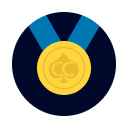punctual
Legend
Silver Level
I have always had the belief that after playing a certain number of hands in poker, I would be a professional. I had thought that everyone had their own number: for me it might be 500,000 hands, for others 1,000,000 and yet for others merely 100,000. This line of thought is similar to theories which have suggested that it takes 10,000 hours of practice to become a master at something.
Well, the results of a new study seems to contradict the 10,000 hour rule.
Depending on whether one classifies poker as a game, sport, or profession, the percentage difference that playing 10,000 hours of poker has on one's performance ranges between 1% (if poker is a profession) and 26% (if poker is a game).
Anyone have an opinion on this?
http://www.businessinsider.com/new-...dwells-10000-rule-2014-7?utm_source=hootsuite
Well, the results of a new study seems to contradict the 10,000 hour rule.
Depending on whether one classifies poker as a game, sport, or profession, the percentage difference that playing 10,000 hours of poker has on one's performance ranges between 1% (if poker is a profession) and 26% (if poker is a game).
Anyone have an opinion on this?
http://www.businessinsider.com/new-...dwells-10000-rule-2014-7?utm_source=hootsuite
Last edited:





